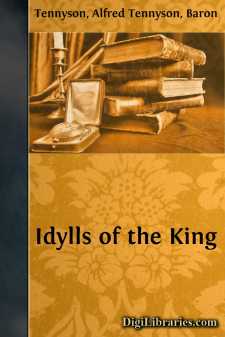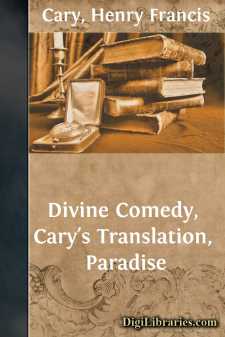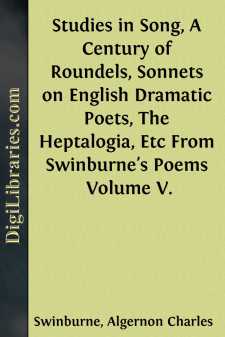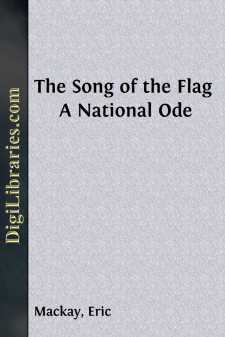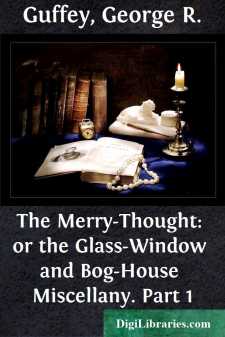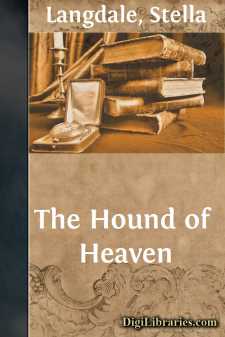Poetry Books
Sort by:
And indeed He seems to me Scarce other than my king's ideal knight, 'Who reverenced his conscience as his king; Whose glory was, redressing human wrong; Who spake no slander, no, nor listened to it; Who loved one only and who clave to her—' Her—over all whose realms to their last isle, Commingled with the gloom of imminent...
more...
PARADISE Canto 1 - 33 CANTO I His glory, by whose might all things are mov'd,Pierces the universe, and in one partSheds more resplendence, elsewhere less. In heav'n,That largeliest of his light partakes, was I,Witness of things, which to relate againSurpasseth power of him who comes from thence;For that, so near approaching its desireOur intellect is to such depth absorb'd,That memory...
more...
ADDRESS TO THE FLAG [After the Battle of Gettysburg.]Float in the winds of heaven, O tattered Flag!Emblem of hope to all the misruled world:Thy field of golden stars is rent and red—Dyed in the blood of brothers madly spilledBy brother-hands upon the mother-soil.O fatal Upas of the savage Nile,Transplanted hither—rooted—multiplied—Watered with bitter tears and sending forthThy venom-vapors till...
more...
ATHENS AN ODEEre from under earth again like fire the violet kindle,[Str. 1. Ere the holy buds and hoar on olive-branches bloom,Ere the crescent of the last pale month of winter dwindle,Shrink, and fall as falls a dead leaf on the dead month's tomb,Round the hills whose heights the first-born olive-blossom brightened,Round the city brow-bound once with violets like a bride,Up from under earth...
more...
by:
John Keats
PREFACE. Knowing within myself the manner in which this Poem has been produced, it is not without a feeling of regret that I make it public. What manner I mean, will be quite clear to the reader, who must soon perceive great inexperience, immaturity, and every error denoting a feverish attempt, rather than a deed accomplished. The two first books, and indeed the two last, I feel sensible are not of...
more...
by:
Eric Mackay
THE SONG OF THE FLAG. I.Up with the country's flag!And let the winds caress it, fold on fold,—A stainless flag, and glorious to behold!It is our honour's pledge;It is the token of a truth sublime,A thing to die for, and to wonder at,When, on the shuddering edgeOf some great storm, it waves its woven joy,Which no man shall destroy,In shine or shower, in peace or battle-time.Up with the...
more...
by:
George R. Guffey
INTRODUCTION For modern readers, one of the most intriguing scenes in Daniel Defoe's Moll Flanders (1722) occurs during the courtship of Moll by the man who is to become her third husband. Aware that the eligible men of her day have little interest in prospective wives with small or nonexistent fortunes, Moll slyly devises a plan to keep her relative poverty a secret from the charming and (as she...
more...
by:
Alfred Gurney
YULE TIDE. TheRoyal Birthday dawns again,A stricken world to bless;And sufferers forget their pain,And mourners their distress. Love sings to-day; her eyes so fairWith happy tears are wet;She is too humble to despair,Too faithful to forget. Her voice is very soft and sweet,Her heart is brave and strong;Her vassal, I would fain repeatSome fragments of her song. A Birthday-song my heart would singIts...
more...
by:
Henry Van Dyke
OF BIRDS AND FLOWERS The VeeryThe Song-SparrowThe Maryland Yellow-ThroatThe Whip-Poor-WillWings of a DoveThe Hermit ThrushSea-Gulls of ManhattanThe Ruby-Crowned KingletThe Angler's ReveilleA November DaisyThe Lily of Yorrow II OF SKIES AND SEASONS If All the SkiesThe After-EchoDulcioraMatinsThe Parting and the Coming GuestWhen Tulips BloomSpring in the NorthSpring in the SouthHow Spring Comes to...
more...
by:
Stella Langdale
The Rev. Mark J. McNeal, S. J., who was one of the successors of Lafcadio Hearn in the chair of English Literature at the Tokyo Imperial University, in an interesting article recounts the following incident of his experience in that institution. "I was seated on the examining board with Professor Ichikawa, the dean of the English department... There entered the room a student whom I recognized as...
more...


